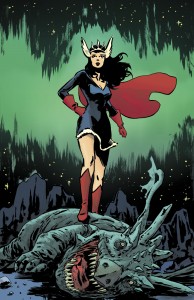 My TCAF weekend started last night with a free screening of the new documentary, Lost Heroes. The film seeks to bring to light the forgotten history of Canadian superheroes from the Golden Age and beyond. Outside of Canada, the names Alpha Flight and Captain Canuck might ring bells, but Nelvana, Johnny Canuck, Northern Guard, The Wing, Commander Steel, and Captain Wonder might not. Truth be told, many of those names are likely new to Canadians, as well.
My TCAF weekend started last night with a free screening of the new documentary, Lost Heroes. The film seeks to bring to light the forgotten history of Canadian superheroes from the Golden Age and beyond. Outside of Canada, the names Alpha Flight and Captain Canuck might ring bells, but Nelvana, Johnny Canuck, Northern Guard, The Wing, Commander Steel, and Captain Wonder might not. Truth be told, many of those names are likely new to Canadians, as well.
The Golden Age of Canadian comics publishing (1941-1946), roughly contiguous to the American Golden Age, was the result of punishing import tariffs and restrictions. During the Second World War, the War Exchange Conservation Act made it all but impossible to import a broad range of American goods and raw materials, including books and comics. The Canadian Whites, so called because they were uniformly black and white (with coloured covers!), filled the gap in the market with original comics created by Canadians for Canadian children, and Canadian reinterpretations of US publisher Fawcett Comics’ popular scripts. And so, for a few short years, a homegrown comics industry flourished.
The comics market at the time was aimed at kids and teens, and their love of superheroes meant that the industry needed to create Canadian superheroes. Many were draped in Canadiana, but not necessarily patriotic. Like the Fawcett and Timely comics being published south of the border, Canadian superheroes were either engaged in the war effort, or having fantastical adventures meant to educate and entertain children. Johnny Canuck, originally a lumberjack-adventurer, was reimagined as a teenage soldier with no special powers but plenty of spunk. Canada Jack, also unpowered, was a motorcycle-riding adventurer and badass, who loved kids and always had their backs. (There were t-shirts, a fanclub, the works!) And Nelvana of the Northern Lights, Canada’s first female superhero, was an Inuit demi-goddess who protected the innocent and visited undersea kingdoms, using her powers of telepathy, flight, invisibility, and a heat ray (I’m not clear on how this worked).
 After the war, the War Exchange Conservation Act was repealed, and American comics were once again available in Canada. In short order, Canadian publishers shuttered their doors — an all too familiar occurrence for those of us living in the shadows of a cultural and economic superpower — and all those Canadian superheroes went with them.
After the war, the War Exchange Conservation Act was repealed, and American comics were once again available in Canada. In short order, Canadian publishers shuttered their doors — an all too familiar occurrence for those of us living in the shadows of a cultural and economic superpower — and all those Canadian superheroes went with them.
Lost Heroes does important historical work, bringing attention to this era of comics publishing and doesn’t shy away from less pleasant questions like, what happened to all those cartoonists who’d been getting steady work? What happened to the publishers? And rather than leave things there, the documentary looks at the impact of the Canadian Whites through successive generations of Canadian cartoonists, and their attempts to rebuild a community of artists and writers around the superhero genre. Some heroes, like 1960s creation Captain Canuck, have had lasting appeal, even if their books have had trouble finding a consistent audience, while others failed to make an impression entirely. But Canadian cartoonists keep trying, be it a reboot of Captain Canuck or Alpha Flight, or a new maple leaf-draped hero.
About midway through the film, writer and artist Ty Templeton posits that we need to see ourselves reflected on the page, and however strained our relationships to our collective Canadian identity (what even is the Canadian identity? My fellow canucks have asked this question countless times), homegrown superheroes allow us to explore Canadianness within the context of this very American genre–it is, in short, a particularly Canadian way to talk about ourselves. Does Canada need its own superhero? It’s an  interesting question. Although Canadian superheroes have struggled to survive, Canadian cartoonists have succeeded (I mean, more so–we all know that a career in the arts isn’t easy). Drawn & Quarterly consistently publishes gorgeous, award-winning books, and Canadian writers and artists have long found a place in the Marvel/DC side of the industry.
interesting question. Although Canadian superheroes have struggled to survive, Canadian cartoonists have succeeded (I mean, more so–we all know that a career in the arts isn’t easy). Drawn & Quarterly consistently publishes gorgeous, award-winning books, and Canadian writers and artists have long found a place in the Marvel/DC side of the industry.
This year, TCAF is full of Canadian content. In addition to the screening of Lost Heroes, Hope Nicholson (a producer of the documentary) and Rachel Richey’s reprint of Nelvana of the Northern Lights makes its debut, and the new Canadian Reading Series puts the spotlight on Canadian creators from the Golden Age and today. From Jack Tremblay, to Ryan North, to Mariko Tamaki, to Julie Delporte, the series alone shows how diverse and thriving the Canadian comics scene is, however low it is on superheroes.

